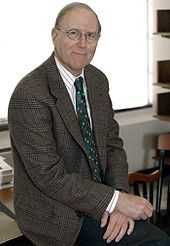John Wilmerding

John Currie Wilmerding, (born 1938), is an American art professor and curator.[1]
Biography
Descended from some of the most prominent families of Old New York society, Wilmerding was educated at Harvard, receiving his A. B. in 1960, his masters in 1961, and his Ph.D. in 1965. From 1977 to 1983 he served as senior curator at the National Gallery of Art, Washington, DC, and deputy director from 1983 to 1988. Wilmerding currently serves as Christopher Binyon Sarofim Professor of American Art at Princeton.[2]
At the opening of the National Gallery of Art's "American Masters from Bingham to Eakins" exhibit in May, 2004, Wilmerding announced that his entire collection of art would remain at the museum. The collection included works by such well-known artists as Martin Johnson Heade, Fitz Henry Lane, John F. Peto, Joseph Decker, Winslow Homer, Thomas Eakins, Frederic Edwin Church, George Caleb Bingham, and John F. Kensett, as well as works by various artists who visited Maine's Mount Desert Island. His contribution added many examples of art the museum had not yet acquired.[1]
Publications
- American Marine Painting (Harry N. Abrams, 1987)
- American Views (Princeton University Press, 1991)
- The Artist's Mount Desert: American Painters on the Maine Coast (Princeton University Press, 1994)
- Compass and Clock (Harry N. Abrams, 1999)
- Signs of the Artist: Signatures and Self-Expression in American Painting (Yale University Press, 2003)
References
- Notes
- References
- ↑ 1.0 1.1 "American Masters from Bingham to Eakins: The John Wilmerding Collection". National Gallery of Art. United States Government. Retrieved 17 January 2011.
- ↑ "John Wilmerding's Profile". Dictionary of Art Historians.org. Retrieved 17 January 2011.
External links
- Biography of John Wilmerding, National Gallery of Art.